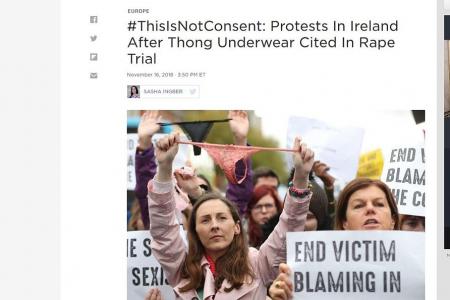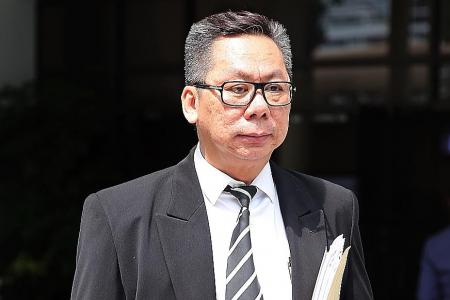Anger over thong claim in rape trial: Uproar after barrister makes victim-blaming comments
Aware joins global outcry over acquittal after defence lawyer suggests alleged victim, 17, consented to sex because she wore a thong
Does wearing a thong mean that a woman is consenting to sex?
This was what a defence lawyer in Cork, Ireland, implied in defending a man, 27, accused of raping a 17-year-old girl.
The Irish Examiner reported that Senior Counsel Elizabeth O'Connell said in her closing remarks of the rape trial earlier this month: "Does the evidence outrule the possibility that she was attracted to the defendant and was open to meeting someone and being with someone?
"You have to look at the way she was dressed. She was wearing a thong with a lace front."
She showed a thong, a piece of underwear with a strip of fabric at the back that exposes the buttocks, to the jury of eight men and four women.
The jurors deliberated for 90 minutes before unanimously acquitting the accused.
Ms O'Connell's argument and the acquittal sparked outrage in Ireland as hundreds of people took to the streets in protest.
It also led to a global movement of women posting pictures of their thongs on social media with the hashtag #ThisIsNotConsent.
In Singapore, the Association of Women for Action and Research (Aware) joined in condemning the practice of victim-blaming in sexual assault cases.
When contacted by The New Paper, Aware's head of advocacy and research, Ms Shailey Hingorani, said Singapore is not spared from "this dangerous belief" of victim-blaming.
She noted that many survivors in Aware's Sexual Assault Care Centre did not seek support or report sexual crimes against them because of negative reactions they had received from their friends, family and even professionals.
"Consent does not come in the form of a piece of cloth or a dress. It has to be freely and voluntarily given by each person involved," Ms Hingorani said.
"Survivors have been assaulted wearing anything from their pyjamas to school uniforms. Sexual assault is not about a woman's clothing.
"It is a choice that a perpetrator makes to disregard someone's consent and autonomy over their own body."
Ms Claire McFarlane, the founder of Footsteps To Inspire - a global campaign to raise awareness for victims of sexual assault - lamented that victim-blaming is common.
The rape survivor told TNP: "We need to stop finding excuses to justify rape and instead ask the rapist why they chose to force another person into a sexual act, why they hurt another person.
"Rape and sexual violence are abuse of power, they have nothing to do with sex. When a sexual act is forced on another person and they don't want it, it is rape. It is as simple as that."
Ms McFarlane, who was in Singapore in March last year to support sexual assault survivors, added: "The world needs specialised sexual violence courts. Victim's rights must be protected during a court hearing."
Condemning Ms O'Connell's remarks as inappropriate, copywriter Chloe Tong, 25, said: "Women, including myself, wear thongs for many reasons besides attracting a sexual partner. Thongs are very discreet under clothing, and they are easy to wash and fast to dry."
A student who wanted to be known as Ms Ting feels it is hard to change mindsets in a conservative society like Singapore.
"Dressing skimpily may draw negative comments from people and undesirable attention, and could put the person in an unwanted situation," she said.
Local cases of victim-blaming
2015
Lawyer Edmund Wong Sin Yee came under fire after he commented on a molestation victim's breast size in court.
He was defending a 24-year-old student from China who was charged after brushing his forearm against the breast of a 22-year-old woman on an MRT train in 2014.
During the 2015 trial, Mr Wong repeatedly asked the woman if she thought she was attractive and stared at her chest after asking her to stand up.
When the judge asked what he was doing, Mr Wong said her breast size and how she was dressed could have tempted the accused to molest her. The accused was found guilty and jailed for five months.
The Court of Three Judges later suspended Mr Wong for five years and rebuked him for his "irrelevant and wholly impermissible" line of questioning, which humiliated the victim.
2016
Teenage magazine columnist Kelly Chopard was accused of victim-blaming an alleged rape victim, who wrote to the Dear Kelly advice column.
She had found herself naked in bed with her boyfriend in the morning after having dinner and watching a movie at his home the night before.
In her reply, Ms Chopard said the writer had "acted like a girl who has been around" and misled her boyfriend into thinking she wanted to have sex.
The magazine apologised after gender equality advocacy group Association of Women for Action and Research accused Ms Chopard of being condescending and unsupportive, and for sending wrong and harmful messages. - ADELINE TAN
Background on Irish rape trial
The rape trial in Ireland centred on the issue of consent amid "he said, she said" testimonies from the accused and the alleged victim, who had met at a club.
The girl, 17, alleged that the man, 27, had dragged her more than 30m to a muddy spot where he raped her even after she asked him to stop.
After the incident, she told him: "You just raped me."
He testified that he replied: "No. We just had sex."
He claimed they had been kissing and "felt attracted to one another on the night".
He named a man who saw them kissing, but this man did not give evidence in the trial.
The defendant also claimed that a witness who said he saw his hand on the girl's throat had misread the situation.
In closing, the prosecutor, Senior Counsel Tom Creed told the jury: "She is quite clear she did not consent. She said she never had sexual intercourse before."
The accused was acquitted after his defence lawyer, Senior Counsel Elizabeth O'Connell, played her thong gambit. When the verdict was announced on Nov 5, the girl sobbed.
Around a week later, about 200 protesters placed their underwear on the steps of Cork's Central Criminal Court to protest against the verdict.
In Dublin, thongs were hung on clotheslines along sidewalks.
Many, such as Irish politician Ruth Coppinger, said showing the victim's underwear in court was humiliating and insensitive.
Ireland's prime minister, Mr Leo Varadkar, said: "Nobody asks to be raped. And it's never the victim's fault.
"It doesn't matter what you wear, it doesn't matter where you went, who you went with, or what you took - whether it was drugs or alcohol." - ADELINE TAN
Get The New Paper on your phone with the free TNP app. Download from the Apple App Store or Google Play Store now




